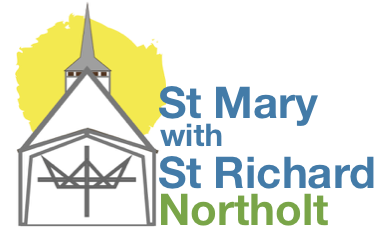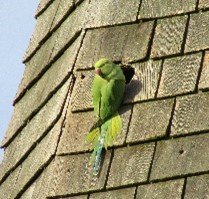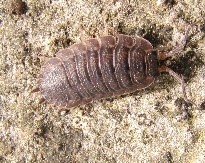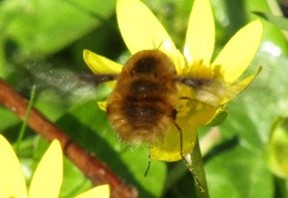We have a huge variety of wildlife in the churchyard. The list below shows what has been recorded so far by our Eco team – maybe you have spotted something else? We have dedicated wildlife areas in the churchyard, plus bug and insect hotels and a footprint tunnel which is a non-invasive tool to look for the presence of mammals in a habitat by identifying their footprints. These areas are not strimmed, but kept specifically for wildlife habitats and wild flowers. Some of our graves that are no longer tended have been ‘adopted’ – our eco team have sown wild flowers and poppies in these graves as remembrance.
Birds
- Blackbird
- Blue tit
- Carrion crow
- Great spotted woodpecker
- Great tit
- Green woodpecker
- Grey heron
- Grey wagtail
- Herring Gull
- Magpie
- Mistle thrush
- Moorhen
- Redwing
- Red kite
- Ring-necked parakeet
- Robin
- Starling
- Swift
- Woodpigeon
- Wren
Mammals
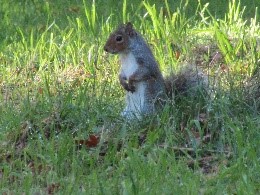
- Brown rat
- Common pipstrelle bat
- Eastern grey squirrel
- Red fox
- Wood mouse
Molluscs
- Brown-lipped snail
- Garden snail
- Netted field slug
- White-lipped snail
Amphibians
- Smooth newt
Annelids
- Flatworm
- Worm
Arachnids
- Garden orb-web spider
- Harvestman
- House spider
- Spider
- Woodlouse spider
Crustaceans
- Common rough woodlouse
- Common striped woodlouse
Trees and shrubs
- Ash
- Bird cherry
- Bramble
- Buddleia
- Cotoneaster
- English oak
- Garden privet
- Hawthorn
- Holly
- Horse chestnut
- Lawson’s cypress
- Lime
- Magnolia
- Norway spruce
- Rose
- Snowberry
- Sycamore
- Viburnum
- Yew
Insects
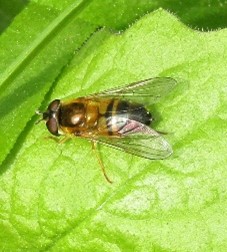
- 7-spot ladybird
- Brimstone butterfly
- Buff-tailed bumblebee
- Clouded drab-moth
- Common green bottle fly
- Common green lacewing
- Common sweep-moth
- Copper ermel moth
- Dark-edged bee fly
- Field grasshopper
- Green shieldbug
- Harlequin ladybird
- Holly blue butterfly
- Horse chestnut leaf miner
- Hoverflies
- Ivy bee
- Ivy boring beetle
- Large white butterfly
- Leafhopper
- Malachite beetle
- Midge gall
- Mirid bug
- Red-legged shieldbug
- Red admiral butterfly
- Ruby-tailed wasp
- Soldier fly
- Speckled wood butterfly
- Western honeybee
Plants
- Black horehound
- Bluebell
- Bristly oxtongue
- Common daisy
- Common field speedwell
- Common nettle
- Cow parsley
- Creeping cinquefoil
- Creeping thistle
- Crocus
- Cyclamen
- Dandelion
- Dock
- Doves foot cranesbill
- False oat grass
- Field bindweed
- Fox and cubs
- Goosefoot
- Grape hyacinth
- Greater plantain
- Hairy bittercress
- Herb bennet
- Herb Robert
- Ivy
- Lungwort
- Narcissus
- Nipplewort
- Oxeye daisy
- Petty spurge
- Pink-headed persicaria
- Pink sorrel
- Primrose
- Purple toadflax
- Ribwort plantain
- Rough hawkbit
- Selfheal
- Shepherd’s purse
- Smooth Hawksbeard
- Smooth sow thistle
- Snowdrop
- Speak thistle
- Sweet violet
- Upright yellow sorrel
- Welsh poppy
- White clover
- White dead nettle
- White stonecrop
- Wild carrot
- Willowherb
- Wood forget-me-not
- Yarrow
- Yorkshire fog
Mosses
- Capillary thread-moss
- Common feather-moss
- Common pocket-moss
- Creeping feather-moss
- Cypress-leaved plait-moss
- Grey-cushioned grimmia
- Rough-stalked feather-moss
- Silky wall feather-moss
- Springy turf-moss
- Wall screw-moss
- White-tipped bristle-moss
- Wood bristle-moss
Funghi
- Blushing rosette
- Ganoderma
- Lichens (different varieties)
- Sycamore tar spot
